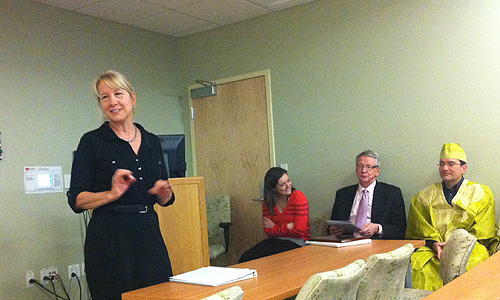Peace Corps Director Honors BUSPH Master’s International Program

The Peace Corps has gone through myriad changes since its founding in 1961, adapting to issues of the times ranging from AIDS to education to new market economies.
But one thing hasn’t changed, according to Peace Corps Acting Director Carrie Hessler-Radelet: “It is, without question, for most people, the best thing they ever did.”
Hessler-Radelet came to the BU School of Public Health Nov. 16 not to recruit for the Peace Corps, but to recognize the 25th anniversary of the school’s Master’s International (MI) Program, which joins a Master of Public Health (MPH) degree with 27 months of field experience in the Peace Corps. BU’s program was the second MI program established in the U.S., and the first in public health. Since then, dozens of MI students have been among the 1,326 BU alumni who have served in the Peace Corps.
“It has been a remarkable partnership,” BUSPH Dean Robert Meenan said, crediting the late William Bicknell, founding chair of the school’s Department of International Health, with establishing the MI program.
Hessler-Radelet, a BU alum, recounted her own experiences as a young woman serving in the Peace Corps in Samoa in the early 1980s, teaching English in an all-girls Catholic school. She was struck by the barriers to health care facing families, and also awed by the experience of being able to impact individual lives.
“That real, practical experience was invaluable,” she told a crowd of students and returned Peace Corps volunteers. “It made a huge difference in my public health career.”
She said the Peace Corps is now in the midst of the most significant reforms in its history, reorganizing its training programs, linking with international agencies, and consolidating its 211 project areas into 30 core areas, in hopes of focusing on interventions that have the highest community impact.
She praised the partnership with BU, which ranks 16th among large colleges in the number of Peace Corps volunteers, with 70 undergraduate alumni serving overseas. Hessler-Radelet presented Meenan with a plaque of appreciation commemorating the 25th anniversary of the MI program.
Among the alumni who served is Joseph Anzalone (SPH ’92), senior manager of the international health department, who recounted his service in a hospital in Liberia from 1987 to 1990. Another alum, Nichole Starr, now a BU medical school student, recalled the “hard lessons” and rewards of her work in Ethiopia through the MI program.
“The Master’s part of the Master’s International Program gave me the technical knowledge,” she said. “The most important lesson from the Peace Corps experience was, ‘You need to shut up and listen’” to the community. She cited as an example helping a group of street kids to carry out their idea of opening a small shop — which was still up and running two years later, when she returned.
Contributed by Lisa Chedekel